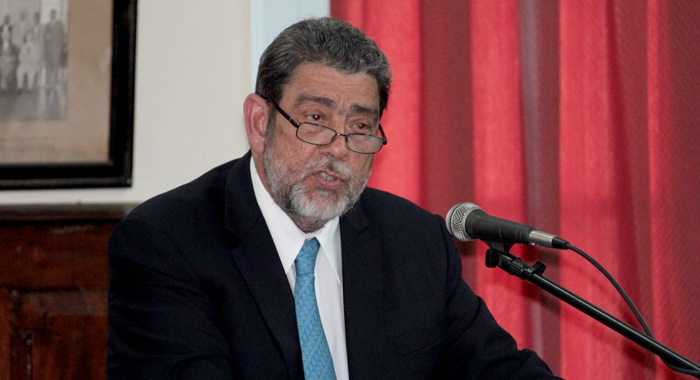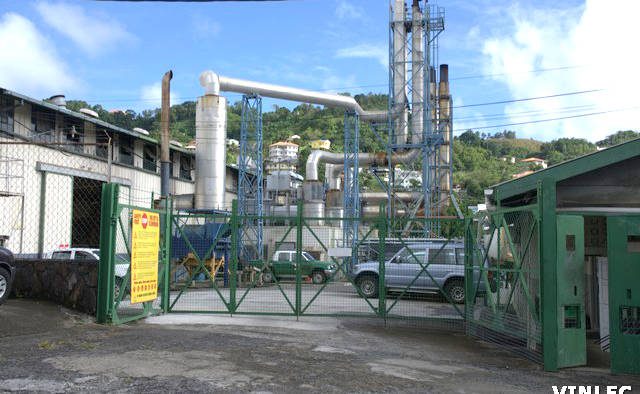“The truth of the matter is this: PetroCaribe does not have the infrastructure to deliver fuel into the Grenadines and Cane Hall.” — Steve Francis, manager of Sol.
PetroCaribe doesn’t have the infrastructure to move fuel from Lowmans Bay to VINLEC’s power stations in Cane Hall and the Grenadines, resulting in a private company buying fuel from one government company and selling it to another in St. Vincent.
In a call to a local radio station last week, Steve Francis, general manager of Sol, a private company that deals in petroleum products, said that under the PetroCaribe arrangement, his company buys fuel from PDV SVG of which the government owns 45 per cent, and sells it to VINLEC, the state-owned electricity company.
The fuel used by VINLEC for electricity generation is purchased from Venezuela under the PetroCaribe arrangement, which allows participating governments to pay for some of the fuel up front and keep the remainder as a 25-year loan at 2 per cent interest.
“The truth of the matter is this: PetroCaribe does not have the infrastructure to deliver fuel into the Grenadines and Cane Hall,” Francis told I-Witness News on Thursday.
“Because the basic idea is to get fuel into VINLEC’s tanks, right? The question is: how would they do it? They do not have the infrastructure. They do not have the road tank wagons to transport fuel to Cane Hall,” Francis said, adding that PetroCaribe is set up to deliver from tanker to terminal.
“Of course, if the terminal is near the coastline, like Lowmans is, of course, that’s where they come in. How do they get it to Cane Hall? They just don’t have the infrastructure to do it,” he told I-Witness News.
Francis said that VINLEC put out a tender for the supply of fuel to Lowmans, Cane Hall, and the Grenadines.
“So, we made a bid like any company and we won the contract,” he said of the arrangement that his company began with VINLEC in 2012.
Before 2012, the other private petroleum products dealer delivered the fuel to VINLEC.
“Shell had a contract many years ago to deliver and after Shell it was Texaco, now Rubis. So, it was nothing new for the oil companies to deliver to VINLEC. PetroCaribe only handle what they can, which is going into Lowmans Bay. They are unable to deliver to the Grenadines as well as into Cane Hall,” Francis told I-Witness News.
Observers have questioned whether Sol buys the fuel, which it then marks up before selling to VINLEC, at the same price at which PetroCaribe supplies fuel to the government.
“I haven’t seen their (the government’s) invoices, but I would think that the formula would be the same,” Francis told I-Witness News.
Observers have also raised questions about the fact that Sol, a private company, buying fuel from PDV SVG, a company owned by the governments of Venezuela and SVG, and selling it to VINLEC, which is owned by the Government of SVG.
“Well, perhaps one should look at this particular question: how did VINLEC get fuel into Cane Hall and the Grenadines prior to PetroCaribe?” Francis said.
Asked if his company adds a markup before selling the fuel to VINLEC, Francis said, “Of course, we must have a margin on it.”
He, however, did not disclose the profit that the arrangement generates for his company.
“I don’t think it is necessary for us to say that. It’s a private contract. We have a contract with VINLEC we have a contract with PetroCaribe. I don’t think it would be proper for me to state the margin,” he said.
Francis told I-Witness News that Sol charters a vessel about twice a month to take fuel to the VINLEC power stations in the Grenadines.
PM’s explanation

Prime Minister Ralph Gonsalves announced in Parliament late last year that Sol was also purchasing fuel under the PetroCaribe initiative, which began as a state-to-state enterprise.
“But we persuaded the Venezuelans, in light of the fact that there are no state facilities by the state to be able to deal with the fuel for
Cane Hall…,” Gonsalves told I-Witness News separately on Thursday.
“So, we persuaded them (Venezuelan). We said, ‘Listen, Sol is a regional company, you sell to private entities elsewhere, though not under the PetroCaribe arrangement. All you would be doing, you would be selling to them and they will be selling to us and we will get the financing benefit from the arrangement, so, it doesn’t change,” Gonsalves told I-Witness News.
He said that when Sol buys the fuel from PDV SVG, they pay the whole amount of money, just like what VINLEC does, and the loan portion is passed on the government.
“The only difference in the arrangement is that there is an intermediary, private sector, buying from them.”
Asked if this means that the cost to VINLEC will be higher than if VINLEC buys directly from PetroCaribe, Gonsalves said, ”No.”
Asked if Sol adds a margin on the price before selling to VINLEC, Gonsalves, who is also Minister of Finance, told I-Witness News:
“The price is basically the same price. … VINLEC used to put the things out for bidding and Shell and Texaco, for years, have been alternating.”
Regarding the question of how Sol, as a private company, provides these services and not mark up the price, Gonsalves said:
“What happens is this: remember, you know, when — a build out prices for fuel is dealt with what is the FOB price, what is the transportation cost, how much you will leave for wholesaler’s margin, how much you will leave for a retailer’s margin, how much is inside there for tax; those things remain constant.
“So this private sector entity, they have been selling all the time at Cane Hall to VINLEC, but from a different source, but not from PDVSA. From Petrotrin in Trinidad, say, or whichever source they got their fuel from, their diesel from. It’s a normal commercial transaction.”
He said his government tries to deliver any petrol it imports “at the cheapest possible price with secure supply.







I have a piece of land in the country with produce on it. I need to get that produce to the kingstown market so I sell the taxi driver my produce then buys it back in town from him. Baffles me. Why didn’t I just pay for transportation? But then I’m not even a DJ so I won’t understand
Lol…… Since u put it that way.
http://www.handsoffvenezuela.org/third_petrocaribes_summit_venezuela_a_saint_vincent_and_the_grenadines.htm
Can someone please explain this line about ‘social inversion’ in Article II of this agreement. “The Government of Saint Vincent and the Grenadines will be responsible for the social inversion.”. From that i am thinking that maybe the gov’t was suppose to take over operations and equipment of SOL and Rubis because inversion to me is to turn things around or upside down. Is it that the ministry of finance don’t have monies to pay immediately so they have to depend on a private company?.
This entire deal stinks to high heavens. I can understand if VINLEC lease or rent the transportation resources, but to buy the oil from a middleman who bought it from the same government that control VINLEC and the entire deal is cause for concern. It would be nice to know how much more it cost the consumer because of this downright double deal. Lets see the books Mr. PM, just show the records, so Arnhim and other qualified accountants can review the entire deal. Come clean or face the electorates.
KS784 not take over don’t try to be smart and look stupid they should pay for transportation. Let me repeat is I have crops growing on my land on the country and I have a stall in the Kingstown market but I don’t have my own transportation what do I do? Sell my crops to someone who have transportation then buy it back to sell in the market or just pay for transport? That’s ABC logic
It’s a commercial practice that suits Sol, there is obviously some particular benefit to the Marxist led SVG Government.
There may well be something in the mortar besides the pestle. We know we must ask questions and stay alert, because we cannot trust anything that the government says or does.